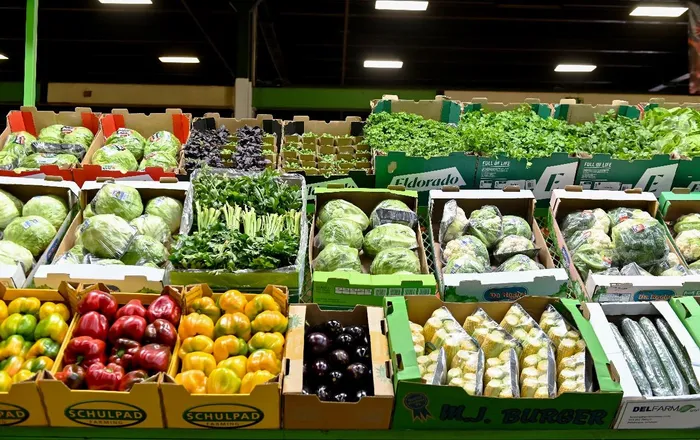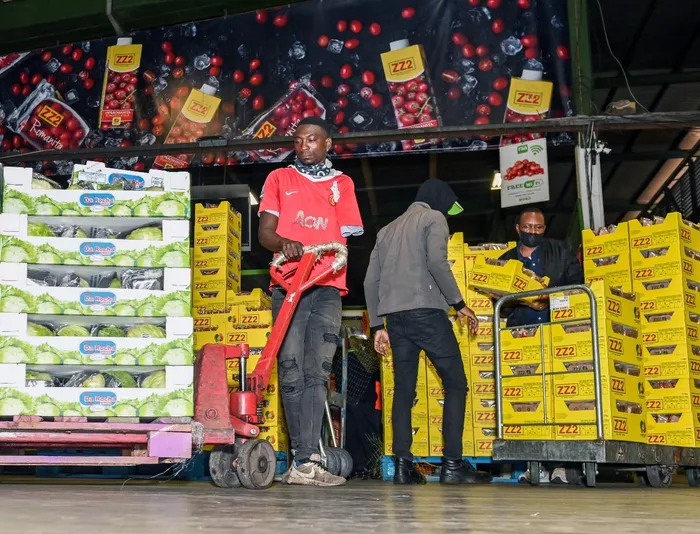Johannesburg to host WUWM conference, focusing on Africa's fresh produce ambitions
AGRICULTURE

The conference, themed “The African Edition: Shaping the Future of Fresh Produce through Sustainability, Innovation and Inclusivity,” is being organised by Joburg Market, the largest fresh produce market on the African continent.
Image: Supplied
Johannesburg is set to host the World Union of Wholesale Markets (WUWM) Conference from May 14-16, 2025, at the Sandton Convention Centre.
The event aims to highlight Africa’s growing significance in the global fresh produce industry while addressing critical issues such as food security, climate change, and the modernisation of markets.
The conference, themed “The African Edition: Shaping the Future of Fresh Produce through Sustainability, Innovation and Inclusivity,” is being organised by Joburg Market, the largest fresh produce market on the African continent.
It is expected to draw industry leaders, policymakers, and innovators from over 200 member countries. Discussions will focus on global agriculture value chains, Africa’s potential for exports and imports, and the integration of advanced technologies to improve market efficiency.
Joburg Market plays a central role in South Africa’s agricultural economy. In the 2023/24 financial year, it reported sales of R11.3 billion and processed 1.4 million tons of produce.
The market holds a 46% share of the national market, surpassing competitors in Tshwane, Durban, and Cape Town. It handles 600 000 transactions monthly, sources produce from over 8 000 producers, and serves 14000 daily buyers, with a registered buyer database of 100 000.
Employing over 6 000 people, the market remains a vital economic contributor in a country facing high unemployment.
Sello Makhubela, the CEO of Joburg Market, explained the city’s strategic position.
“As South Africa’s economic hub and home to Joburg Market, we are uniquely positioned to facilitate meaningful discussions on food security, sustainability, and the modernisation of wholesale markets,” he said.

Sello Makhubela, the CEO of Joburg Market, explained the city’s strategic position.
Image: Supplied
In an interview, Makhubela further explained the conference’s importance.
“We’re bringing the world to Africa, and we want to learn from the world to advance as Africa,” he said.
He highlighted the event's potential to foster international trade partnerships and establish Africa as a significant player in the global fresh produce market.With 60% of the world’s uncultivated land located in Africa, he noted the continent’s vast potential for agricultural expansion.
“Africa has an opportunity to use that land to cultivate and start delivering fresh produce worldwide,” Makhubela added.
Founded in 1958 and headquartered in The Hague, Netherlands, the WUWM connects over 150 wholesale markets and 30 retail and street markets globally, promoting sustainable food distribution and innovation.
The Johannesburg conference will include sessions on logistics, cold chain solutions, and digital trading platforms, drawing insights from leading markets in France and Spain.
Upgrading infrastructure, including cold storage and banana ripening facilities, is a key component of Joburg Market’s “Smart Fresh Produce Market Strategy.”

Upgrading infrastructure, including cold storage and banana ripening facilities, is a key component of Joburg Market’s “Smart Fresh Produce Market Strategy.”
Image: Supplied
Joburg Market faces strong competition from private markets and retailers with sophisticated distribution centers, which have led to a decline in the market share of national fresh produce markets due to insufficient infrastructure investment.
To address this, the market is seeking R3.2bn through public-private partnerships to expand its trading space by 45 000 square meters, improve cold storage capabilities, and diversify into agri-business and value-added services.
The strategy incorporates clean energy solutions, waste management systems, and advanced trading technologies, with the aim of increasing throughput by 20%, enhancing profitability, and ensuring compliance with Hazard Analysis and Critical Control Point standards.
“These enhancements will create jobs, strengthen food security, and improve affordability,” Makhubela said.
New agro-processing facilities are expected to increase sales volume, while digital solutions such as cashless payment systems and online trading platforms will streamline operations.
The market’s transformation program also aims to support small-scale farmers by providing access to its platform, addressing supply-demand imbalances that are worsened by climate change and high prices.
Makhubela underscored Africa’s crucial role in global food security, particularly in rapidly growing urban centers like Johannesburg, where access to affordable food is essential for the increasing population.
“We need more farmers to increase accessibility and lower prices,” he said, pointing out that current prices are unsustainable for many, especially low-income households.
The conference will tackle these issues, exploring methods to scale up production and improve logistics for perishable goods.Geopolitical tensions, including tariffs and restricted access to markets like the United States for exports such as avocados, present significant challenges.
“Resolving political tensions and fostering partnerships are crucial,” Makhubela said.
He stressed the importance of the American market and the need for African governments to address trade barriers. The outcomes of the conference are expected to contribute to G20 discussions on food security later in 2025, amplifying Africa’s voice on the global stage.
The South African government is actively encouraging trade within Africa, and Joburg Market is aligning its Smart Market Strategy to support these efforts. While some countries, such as Botswana, maintain import restrictions, broader continental initiatives aim to facilitate open borders.
“Free trade across Africa is essential for our market’s growth,” Makhubela said, noting that the market’s 16 agents, including six black economic empowered agents, are vital for promoting inclusivity.
Joburg Market’s modernization plans are ambitious but face hurdles. The R3.2bn capitalization program is still under review.
“This is a ripe opportunity for investment with good returns,” Makhubela said.
The conference will also address macro-environmental challenges, such as climate change and increasing competition, which threaten the sustainability of wholesale markets. Joburg Market’s strategy Aldo underlines the need to develop of human capital and the integration of systems to maintain competitiveness.
“Johannesburg is proud to serve as the gateway to Africa for this gathering,” Makhubela said.
The event will also play a role in shaping the future of fresh produce markets through innovation and inclusivity.Industry analysts view the conference as a critical juncture for Africa’s fresh produce sector.
“Africa’s agricultural potential is undeniable, but it needs investment in infrastructure and technology to compete globally,” commented Thandiwe Nkosi, an agricultural economist at the University of Pretoria.
She noted that Joburg Market’s scale and strategic vision position it favorably to lead this transformation, provided it secures the necessary funding.
As Johannesburg prepares to welcome delegates from around the world, the focus is on Africa’s capacity to convert its extensive resources into tangible economic benefits.
For Makhubela, the conference is more than just a forum for discussion; it is a catalyst for action.
“We want practical outcomes,” he said. “This is about building partnerships, sharing knowledge, and driving innovation to ensure Africa’s fresh produce markets thrive.”
BUSINESS REPORT